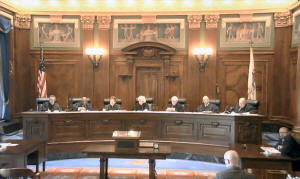Illinois Supreme Court strikes down Cook County tax on guns
 Send a link to a friend
Send a link to a friend
[October 22, 2021]
By JERRY NOWICKI
Capitol News Illinois
jnowicki@capitolnewsillinois.com
 SPRINGFIELD – The Illinois Supreme Court
ruled Thursday that a Cook County tax on gun purchases is
unconstitutional, but it left the door open for a more tailored tax that
specifically goes toward mitigating gun violence and its effects. SPRINGFIELD – The Illinois Supreme Court
ruled Thursday that a Cook County tax on gun purchases is
unconstitutional, but it left the door open for a more tailored tax that
specifically goes toward mitigating gun violence and its effects.
The Cook County gun tax, which took effect in April 2013, imposed a $25
fee for retail gun purchases in the county, as well as a 5 cent fee per
cartridge of centerfire ammunition and 1 cent per cartridge fee for
rimfire ammunition.
The taxes were challenged by the trade group Guns Save Life Inc. in a
lawsuit against the county.
The Supreme Court’s Thursday opinion, written by Justice Mary Jane
Theis, stated that, “While the taxes do not directly burden a
law-abiding citizen’s right to use a firearm for self-defense, they do
directly burden a law-abiding citizen’s right to acquire a firearm and
the necessary ammunition for self-defense.”

In the 14-page, 6-0 opinion, the Supreme Court reversed an appellate
court ruling that would have allowed the taxes to stay in place. Chief
Justice Anne Burke did not take part in the decision.
While the court rejected the tax, it did specifically note that the
county’s failure to earmark the revenue from the tax for gun violence
prevention programs played a major role in the decision.
It gave particular scrutiny to the question of whether the tax violated
the uniformity clause of the Illinois Constitution, which states: “In
any law classifying the subjects or objects of non-property taxes or
fees, the classes shall be reasonable and the subjects and objects
within each class shall be taxed uniformly.”
Citing previous court precedent related to that clause, the court wrote
it had to determine whether the tax on guns “bears some reasonable
relationship to the object of the legislation or to public policy.”
“Under the plain language of the ordinances, the revenue generated from
the firearm tax is not directed to any fund or program specifically
related to curbing the cost of gun violence,” the court wrote.
“Additionally, nothing in the ordinance indicates that the proceeds
generated from the ammunition tax must be specifically directed to
initiatives aimed at reducing gun violence. Thus, we hold the tax
ordinances are unconstitutional under the uniformity clause.”
Justice Michael Burke agreed with the opinion, but issued a four-page
special concurrence disagreeing with the majority’s analysis that the
county’s spending plans affected whether the tax was permissible.
“The majority’s analysis is problematic because it leaves space for a
municipality to enact a future tax — singling out guns and ammunition
sales — that is more narrowly tailored to the purpose of ameliorating
gun violence,” Michael Burke wrote.
[to top of second column]
|

The Illinois Supreme Court is pictured at the Supreme
Court building in Springfield last month. The justices struck down a
Cook County tax on gun sales in an opinion released Thursday.
(Credit: Blueroomstream.com)

He argued the majority opinion is leading the county
“down a road of futility,” citing Article 1, Section 22 of the state
constitution, which reads: “Subject only to the police power, the
right of the individual citizen to keep and bear arms shall not be
infringed.”
“The only problem with the majority’s approach — and the guidance it
offers the county — is that such counsel, if followed, would still
violate the provision of the Illinois Constitution noted above that
plainly states that the right of the individual to keep and bear
arms is subject only to the police power, not the power to tax,” he
wrote.
“Thus, the majority is leading the county down a road of futility,”
he added.
One major precedent cited by the court was from Boynton vs. Kusper,
a 1986 Supreme Court ruling which struck down a $10 state tax on
marriage licenses in certain counties that went to the Domestic
Violence Shelter and Services fund.
The court said at the time the marriage license tax “directly
impeded the exercise of the fundamental right to marry,” and should
be subject to greater scrutiny.
The court ruled in the Boynton case that even though the $10 fee was
“de minimis,” or small, if the court granted that authority, it
would essentially mean “there is no limit on the amount of the tax
that may be imposed,” according to previous case law.
The same argument can be applied to the gun tax, the court wrote,
noting that a stricter level of scrutiny is needed because the tax
applies to a fundamental right.
Given that necessary scrutiny, the court ruled the gun taxes
unconstitutional.

“In applying that standard to the firearm and ammunition taxes, we
recognize that the uniformity clause was ‘not designed as a
straitjacket’ for the county … and acknowledge the costs that gun
violence imposes on society,” the court wrote. “Nevertheless, the
relationship between the tax classification and the use of the tax
proceeds is not sufficiently tied to the stated objective of
ameliorating those costs.”
Capitol News Illinois is a nonprofit, nonpartisan
news service covering state government and distributed to more than
400 newspapers statewide. It is funded primarily by the Illinois
Press Foundation and the Robert R. McCormick Foundation. |